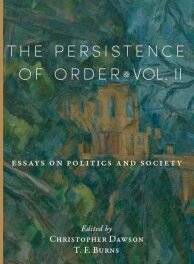We support our Publishers and Content Creators. You can view this story on their website by CLICKING HERE.
Wilhelm Röpke maintained that freedom depends upon certain social and moral factors, which are essential for a free enterprise system to be successful, enduring, and truly free.
A Humane Economy: The Social Framework of the Free Market, by Wilhelm Röpke, Wilmington, DE: Intercollegiate Studies Institute, 1998. 200 pp.
Wilhelm Röpke (in some texts spelled “Roepke”), a German economist, taught economics in his homeland until the arrival of Hitler’s regime, at which time he emigrated and after some years settled in Switzerland. During his life (1899-1966), Röpke authored more than 20 books, setting forth his economic and social theories in detail. Implemented by West Germany in the postwar years, these theories were crucial to the revival of that nation’s economy after its near total devastation in the war.
Like von Mises, Hayek, and others, Röpke’s economic views were shaped by the Austrian School, and he was therefore committed to the ideas of freedom, free enterprise, and minimal government activity in the economic domain. Like von Mises, he argued that economic centralization, planned economies, nationalization, and all of the various bromides and catchwords of Leftism, lead men into the grim labyrinth of servitude. However, Röpke’s writings embrace important additional elements, often overlooked by economists and for that reason his outlook is singular and valuable. Let us now consider his ideas as presented in this new edition of one of his classics.
A Humane Economy first appeared in English in 1960 and was hailed by reviewers, one calling it “a seminar on integral freedom, conducted by a professor of uncommon brilliance.” Indeed so, for Röpke maintained that freedom depends upon certain social and moral factors, which are essential for a free enterprise system to be successful, enduring, and truly free.
Röpke writes: “The questionable things of this world come to grief on their own nature, the good ones on their own excesses. … Whatever political tendencies or currents we choose as examples, it will be found that they always sow the seeds of their own destruction when they lose their sense of proportion and overstep their limits.” A free economic system, he says, is no exception, because it will flourish, and can be defended, “only as part of a wider general order encompassing ethics, law, the natural conditions of life and happiness, the state, politics, and power.” The whole of a society cannot be ruled by the laws of supply and demand, nor is a market economy the alpha and omega of human life, because man does not live by bread alone.
A sound economic system, Röpke observes, “must find its place in a higher order of things which is not ruled by supply and demand, free prices and competition. It must be firmly contained within an all-embracing order of society in which the imperfections and harshness of economic freedom are corrected by law and in which man is not denied conditions of life appropriate to his nature.” He puts in another way: “The market is only one section of society. It is a very important section, it is true, but still one whose existence is justifiable and possible only because it is part of a larger whole which concerns not economics but philosophy, history, and theology.” It is “the economic order proper to a definite social structure and to a definite spiritual and moral setting.”
If a free market can operate only within the boundaries of ethics, morality, and law, that does not mean that Röpke favors any form of welfarism, socialism, or other collectivist schemes. On the contrary, he excoriates the welfare state as one of the “spreading cancers of our Western economy and society.” In truth, he warns that “Economically ignorant moralism is as objectionable as morally callous economism. Ethics and economics are two equally difficult subjects, and while the former needs discerning and expert reason, the latter cannot do without humane values.” Those humane values, Röpke makes clear, are Christian. Thus, traditional Christian social teaching is intrinsic to sound social policy.
Irrespective of its welfarist accretions, which have obviously exacerbated our cultural decline, society today has some very grave problems, problems that are systemic. Röpke believed that modern mass society is characterized by what in German he called Vermassung, best rendered “enmassment” in English. Enmassment refers to a human condition distinguished by overcrowding, social fragmentation, and institutional gigantism, where persons “become mere passively activated mass particles or social molecules” and where all “poetry and dignity, and with them the very spice of life and its human content, go out of life.”
Collectivized institutions are the cardinal feature in this modern landscape. Man lives a largely controlled existence, besieged by the “bloated colossus” of government, transnational corporations, huge educational institutions, an all-pervasive mass media, and other such organizations, all gargantuan in scale, a scale neither human nor humane, and all with interlinked management and control. In such a mass environment, men are mere atoms, mere statistics, tiny cogs in great machines, while society itself, in Röpke’s words, “is simply a sand heap of individuals who are more dependent than ever, and at the same time more isolated, uprooted, abandoned, and socially disintegrated than ever.”
In contemporary society, genuinely independent organizations, organizations that give identity, a sense of significance, and a sense of rootedness and stability to the individual, that help to integrate him into his community and that at the same time have the power to protect him against the mindless depredations of mammoth bureaucracies are practically nonexistent. The result, Röpke remarks, is that “loneliness, separateness, and isolation are becoming the destiny of the masses, and this is a situation which is so highly pathological that one is tempted to agree in this respect with certain serious authors who regard our modern world as afflicted by collective lunacy.”
In the economic sphere, people are “divested of their natural individuality, both as producers, turning out mass products by more and more mechanized methods, and as consumers, because mass products cannot cater to individual tastes and because, at the same time, the class of people wealthy enough to buy custom-made goods is dwindling fast, thanks to invidious taxation imposed by the crushing majority of consumers with ‘shared tastes.’” He warns that this obsession with standardization, in the name of efficiency, can mean but one thing in the long run: “the standardization of objects demands and eventually enforces the standardization of persons.”
Considering Röpke’s critique of many political, social, and economic trends of the twentieth century, one begins to ask if there is any way out of the apparent cul-de-sac. The author offers no inflexible, ideological solution, and, least of all, does he look to government for answers. Those so-called solutions merely contribute to more gigantism, more individual alienation, more of the herd mentality.
Röpke holds that we must see the current situation as one which offers the choice between two antithetical principles: centrism and decentrism. The models posed by these two contrary approaches, he contends, “ultimately constitute the watershed between all the currents of thought and points of view” that swirl about us in the modern world. “This,” he writes, “is where federalism and local government clash with political centralization. It is here that friends of the peasantry, the crafts, and middle classes, and the small firm and of widely distributed private property and the lovers of nature and of the human scale in all things part company with the advocates of large-scale industry, technical and organizational rationality, huge associations, and giant cities. … The centrist is none other that the social rationalist…. Seen from his central point, the individual is small and eventually dwindles to a statistical figure, a building brick, a mathematical magnitude encased in equations, something that can be ‘refashioned,’ in short, something that may well be lost sight of. … By contrast, the decentrist, who thinks in terms of human beings and also knows and respects history, is skeptical or pessimistic and in any case bases his arguments realistically and unsentimentally upon human nature. The centrist is doctrinaire, the decentrist undoctrinaire and unideological.”
Many of the current crop of political celebrities are brought to mind by Röpke’s description of the centrist as “a moralist of the cheap rhetorical kind, who misuses big words, such as freedom, justice, rights of man, or others, to the point of empty phraseology, who poses as a paragon of virtues and stoops to use moralism as a political weapon and to represent his more reserved adversary as morally inferior. Since … he looks at things from on high, well above the reality of individual people, his moralism is of an abstract, intellectual kind.” The centrist’s morality, in other words, is the “social morality” so popular with the Left these days, which judges a public figure not by his character or honesty, but by the government programs he supports and how “politically correct” he is. So it is that the centrist “makes demands on human nature without considering either the concrete conditions or the possible consequences of the fulfillment of those demands.”
Notions of radical equality and uniformity, so beloved of Leftism and liberalism, are fundamental to centrism, whereas the decentrist knows that genuine freedom is always colored by “ a certain stratification of society, respect for natural developments, a modicum of variety and of horizontal and vertical social articulation, family traditions, personal inclinations, and inherited wealth.” In opposition to the centrist ideal of government-imposed equality and uniformity, “the ideal of decentrism requires us to stand for variety and independence in every sphere.”
However, Röpke’s emphasizes, decentrism does not by any means denote particularism, parochialism, or narrow-mindedness. Rather, the decentrist “must keep his eye on a larger community which is all the more genuine for being structured and articulated. His center is God, and this is why he refuses to accept human centers instead, that is, precisely that which consistent centrism, in the form of collectivism, intends to present him with.” Power is a difficult temptation for human beings, given their flawed dispositions. Power, while necessary to good order, must therefore be limited and decentralized.
The path of centrism, the author says, “is bound to lead to regions where the air of freedom and humanity becomes thinner and thinner, until we end up on the icy peaks of totalitarianism, from which nations can hardly hope to escape without a fall. The trouble is that once one takes this road, it becomes increasingly difficult to turn back.” Those who cherish freedom, and who wish to see their society returned to a human scale like that enjoyed in earlier times, must see the road ahead as one with many forks, a road necessitating thousands of decisions. Everywhere there looms the question: centrism or decentrism? In politics as in economics, centrism leads to Vermassung, enmassment, and all its attendant ills, whereas decentrism leads to a stronger sense of community, to liberty, and to a greater sense of satisfaction and order in, a greater control over, our individual lives.
Let it be stressed that this short review merely touches upon a small number of highlights from Wilhelm Röpke’s magnificent book, the full text of which is essential for a thorough understanding. This work, and Professor Röpke’s other works, should be read by every student of economic and social thought, and every lover of civilization and freedom.
Republished with gracious permission from the Intercollegiate Review.
This essay was first published here in August 2010.
The Imaginative Conservative applies the principle of appreciation to the discussion of culture and politics—we approach dialogue with magnanimity rather than with mere civility. Will you help us remain a refreshing oasis in the increasingly contentious arena of modern discourse? Please consider donating now.
The featured image is courtesy of Pixabay.

 Conservative
Conservative  Search
Search Trending
Trending Current News
Current News 






